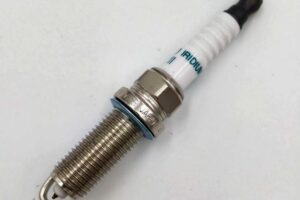If you plan to give your vehicle a tune-up, it’s important to have all the required tools and materials. One important thing you need is a tube of dielectric grease. What is dielectric grease? What is dielectric grease used for?
Also called tune-up grease, dielectric grease is a multi-purpose grease that helps protect electric components against moisture and corrosion. Because this grease is silicone-based, it is not an electrical conductor, so you should not apply it on mating connectors of electrical circuits.
Read on to learn more about what dielectric grease is, its uses, and the reasons why you need to have a tube of it in your toolbox all the time.
What Is Dielectric Grease?
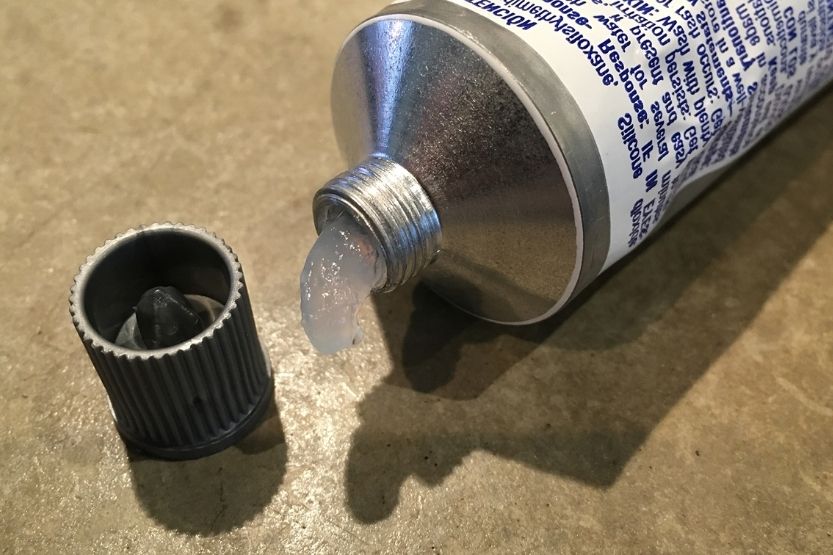
Dielectric grease is one of the many different lubricants that you can find inside your automobile with many uses. What is dielectric grease made of? Dielectric grease is actually a silicone-based lubricant commonly used in automotive electronic ignition systems.
It is a waterproof grease made by combining silicone oil with a thickener. The silicone oil is usually polydimethylsiloxane (PDMS), and the thickener is amorphous fumed silica.
Dielectric grease is usually for repelling moisture. Because it is non-conductive, there is no chance of it shorting out the system. It prevents it from happening. Keeping moisture away from the connectors also allows improved conductivity.
Aside from moisture, dielectric grease also helps keep sand, dirt, and other small debris from getting inside the connectors and preventing them from working properly. It is useful for sealing spark plug boots and keeping battery terminals in good condition.
If you plan to get a tube of dielectric grease, you need to know that you cannot use it for lubricating wheel bearings and other mechanical moving parts.
What Is the Difference Between Dielectric and Lubricating Grease?
1. Dielectric Grease Has a Low Melting Point
Dielectric grease is very different from regular lubricating grease. From its physical properties and to how it is used, it is totally different. Unlike regular grease that melts easily when subjected to intense heat, dielectric grease pretty much retains a similar consistency, thanks to its low melting point.
It is the reason why it is suitable for use on spark plug boots that experience intense heat as they ignite the fuel in the combustion chambers. Aside from spark plugs, you can also use them on your car’s battery terminals to prevent them from corroding.
2. Dielectric Grease Is Not Soluble in Water, Mineral Oil, and Others
Also, unlike other types of grease, dielectric grease will not dissolve in water, mineral oil, methanol, and other solvents. This makes this product ideal for outdoor and marine uses. If you own a boat, it is best to use it on your electric connectors to prevent rusting.
3. Cost
Cost is also a major difference, with dielectric grease being more expensive than other kinds of lubricants. It is the reason why you usually only find dielectric grease being sold in small tubes.
4. Dielectric Grease Does Not Conduct Electricity
Lastly, dielectric grease does not conduct electricity, so it will protect your vehicle’s electric systems by not allowing fusing and arcing in the electric terminals and connectors.
What Is Dielectric Grease Used For?
1. Protect Light Bulb Sockets
There are many uses of dielectric grease. Aside from sealing spark plug boots, which is the most common task that uses this grease, you can use it on ignition systems, electrical connectors of travel trailers, and headlamps. You will also find them useful for protecting light bulb sockets and battery terminals against oxidation.
2. Prevent Voltage Leakage
Professional mechanics also use dielectric grease in high-energy ignition systems to prevent voltage leakage. This grease is great for electric connectors and terminals, including spades, butt connectors, and terminals. This grease helps seal, lubricate, and keep electric connectors’ rubber parts flexible and prevent them from cracking.
3. Seal Spark Plugs
As mentioned earlier, one of the most common uses of dielectric grease is to seal spark plugs. Applying a bit of grease on the rubber boot of the spark wire makes it easier to slide it over the spark plug’s ceramic insulator. It also promotes ease in removing it later. Spark plugs are constantly exposed to high temperatures, so dielectric grease is the perfect choice for them.
4. Acts as a Sealant and Lubricant for Electrical Connectors
You can use it on the gaskets of multi-pin connectors or the rubber mating surfaces in automotive engines. In this case, dielectric grease acts as a sealant and lubricant for electrical connectors. However, avoid using it other than for its intended purpose.
Advantages and Disadvantages of Dielectric Grease
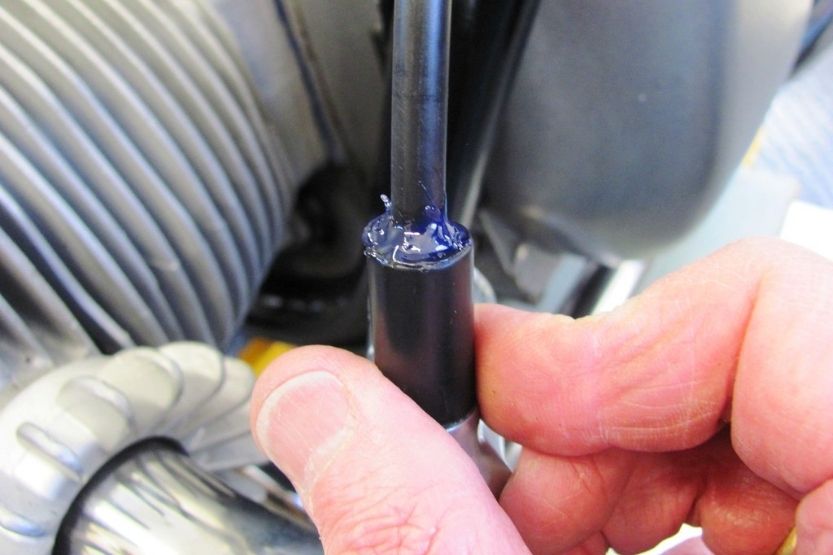
Advantages
1. Provides a Good Seal on Metal Surfaces
Dielectric grease comes with a lot of advantages, most especially when used properly. One of the major benefits of this grease is that it provides a good seal on metal surfaces. Applied to the metal parts of any electrical system, the dielectric grease will keep them from rust and corrosion. It can also withstand extreme heat, and even up to temperatures as hot as 500° F, it can still retain its seal.
2. Protects Plastic and Rubber Components of Electrical Systems
Another advantage of dielectric grease is that it protects the plastic and rubber components in electrical systems. It also offers protection to the computer chips against fire and other accidents. By covering the connecting surfaces with a layer of this grease, it is possible to lessen resistance significantly and prevent them from oxidizing.
3. Helps Insulate Electrical Systems
The silicone-based dielectric grease can help insulate electrical systems and keep the buildup of oxidation to a minimum, thereby preventing signal loss and increased resistance.
Dielectric grease is most useful to use on multi-pin connectors. It will prevent arcing and shorts circuits between the pins. It is also good for lubricating certain engine components like speedometer cables, rotors, and the distributor cap.
Disadvantages
1. It Can Prevent Electric Flow When Misused
Even though dielectric grease does have many benefits, it can also be detrimental when you misuse it. Note that this grease is non-conductive, so it will prevent the proper flow of electric current if you misuse it. For instance, if you put too much dielectric grease on contact points, then electric current will not be able to pass through them efficiently.
2. It Can Melt Silicone Rubber After a While
Here is a serious disadvantage of dielectric grease – it can melt silicone rubber after a while. It is the reason why you should not use this product on conductors encased in rubberized silicone.
Also, seeing as dielectric grease is a bit caustic, you need to wear rubber gloves and safety glasses when using this lubricant.
3. When Exposed to High Temperatures, Formaldehyde May Form
Another thing about dielectric grease is that when exposed to high temperatures, it will produce formaldehyde gas. It can irritate your nose and lungs and cause your eyes to water. With that, you have to let the engine cool considerably before using the grease on your car’s engine.
Dielectric Grease Buying Guide
There are many different brands of dielectric grease, and they are not created equal. Because this grease can be quite expensive, you would want to get the best bang for your buck.
To help you get the best dielectric grease, here are some factors that you should consider when shopping for one:
1. Viscosity
Viscosity is a fluid’s property that makes it resistant to flowing freely. You can also use this term to describe a paste’s tackiness. You need to get a dielectric grease with a high enough viscosity that it can easily stick on any surface you apply it to. This is especially true if the said surface is completely smooth.
This property will ensure that the grease will not burn or wear out, which will render it useless when it comes to preventing rust and repelling moisture away from electrical connections.
Unfortunately, there is no way to test the viscosity of dielectric grease before buying. Therefore, the best thing that you can do is to read online customer reviews about the product. You might even find videos that demonstrate the use of the product so you can have at least visual confirmation of its consistency.
2. Budget
As mentioned several times before, silicone dielectric grease is a lot more expensive than regular white lithium grease and petroleum jelly (which many mechanics still use instead of dielectric grease). Some brands are also more expensive than others. With that said, you need to consider your budget when shopping for a tube of the stuff.
Considering that a little dielectric grease goes a long way, you should get the most expensive one that can fit your budget. When it comes to dielectric grease, the more costly the product, the better it is. Remember that you will be using this grease to protect the electric system of your car. Using a cheaper alternative may result in costlier repairs later.
3. Tolerance to Extreme Heat
You will be using dielectric grease on car parts constantly exposed to high temperatures, so get one with the highest heat tolerance. The dielectric grease would be somewhat useless if it easily melts and runs when exposed to heat.
Since dielectric grease contains silicone, it will be naturally resistant to heat, but not all these products are created equal. Some contain nearly enough silicone. Check the label for the grease’s melting point and get the one that has the highest heat tolerance that you can find.
Dielectric Grease FAQs
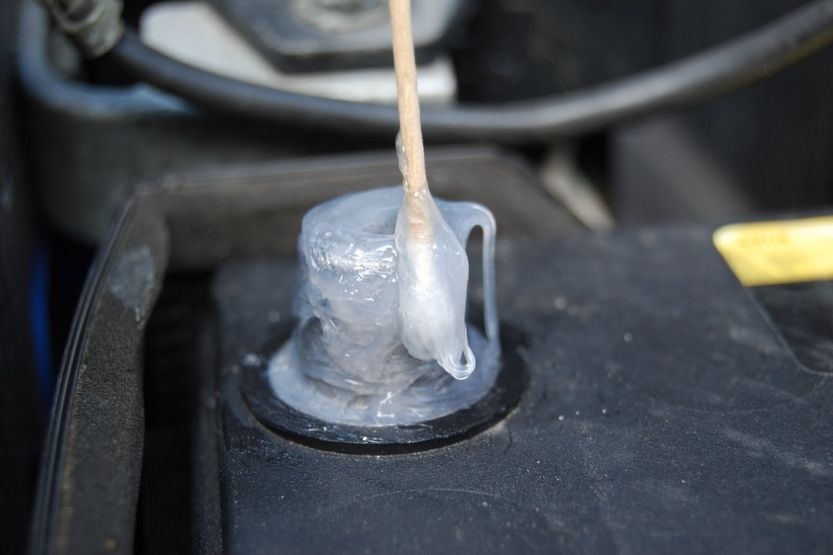
Can I Use Dielectric Grease on Battery Terminals?
Yes, it is highly recommended that you do so. If you have been using petroleum jelly on your battery terminals up to now, then it is time for you to switch to dielectric grease. Although petroleum jelly does work well in keeping your battery’s terminals oxidation-free, it melts easily when exposed to even a bit of heat.
Dielectric grease, even when exposed to extreme heat, will not easily lose its viscosity and melt. It means that it will last longer, thereby protecting your battery better. However, you need to be careful not to apply too much grease as it might impede the flow of electricity from the battery to the terminal.
Is Silicone Grease the Same as Dielectric Grease?
They are the same as both greases contain silicone. However, what makes them different from each other is the way that they cure.
Silicone grease, when allowed to cure, turns into a hard but still slick shell. This type of grease is the best for lubricating moving components like wheel bearings and such. On the other hand, dielectric grease does not get hard when cured. It may get a bit stiffer but will remain pliable.
Can Dielectric Grease Be Used on Circuit Breaker?
Yes, you can, but you need to do so with caution. Not all parts of a circuit breaker need dielectric grease and applying it might even be detrimental. Most of the time, though, the only reason why you would even need to apply dielectric grease is that the circuit breaker is in a corrosive atmosphere, such as the seaside.
Consult the circuit breaker’s manual to find out which specific components need lubrication. It usually includes the bus stands, main contacts, and finger clusters. Be extra careful when deciding which components to grease. Apply only the bare minimum amount of grease so that it will not affect their conductivity.
Can I Use Dielectric Grease on O-Rings?
Dielectric grease is the best for O-rings. If you assemble components that come with O-rings, apply a bit of dielectric grease on the rings to make them easier to squeeze into place. It will prevent the rubber rings from scuffing along the sides and possibly tearing. The grease will also improve the sealing capability of the O-ring.
Conclusion – What Is Dielectric Grease Used For?
Also called tune-up grease, dielectric grease is a type of lubricant that does not just make surfaces slippery. It also protects electrical components in your car’s engine from rust and corrosion. Because it is silicone-based, dielectric grease will not conduct electricity. Thus, you should not apply too much to mating connectors of electrical circuits.
Dielectric grease is just one of the many kinds of lubricants that you can find in your car. Now, are you required to use dielectric grease? Not really. Your car will still function properly even without this grease. However, if you want to protect your car’s electric system and make it last for as long as possible, then use it the next time you tune up your vehicle.
Related reading:
Bulb Grease – What Is It and How to Apply It?

![How Much Is a Used Tire? Average Cost of Used Tires [Guide] how much is a used tire](https://roadsumo.com/wp-content/uploads/2022/03/how-much-is-a-used-tire-150x150.jpg)
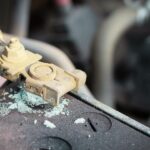
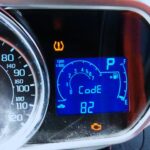
![Check Engine Light On and Off Intermittently [Causes and Fixes] check engine light on and off](https://roadsumo.com/wp-content/uploads/2021/06/check-engine-light-on-and-off-150x150.jpg)


